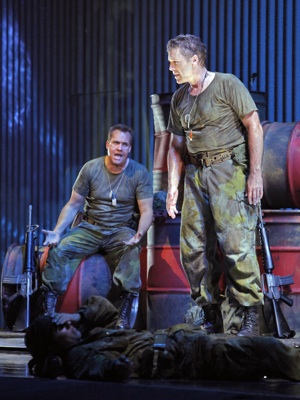
Ground Zero
This past week the news team for the BBC’s “World Have Your Say” traveled the American heartland, asking for citizens’ reactions to the tenth anniversary of 9/11. Prominent among their questions was: “Do you think Americans have become more nationalistic since 9/11?”
Judging by last night’s world premiere of “Heart of a Soldier” at the San Francisco’s War Memorial Opera House, the answer is yes.
How often at the beginning of an opera does the company’s director come over the PA system to ask the audience to rise and sing the national anthem? The audience dutifully did so and, perhaps because many singers go to the opera, it sang that difficult anthem remarkably well. The gesture was uncomfortably reminiscent of the Cold War.
In her comments about the genesis of “Heart of a Soldier,” librettist Donna Di Novelli remarked that “we were not going to write a ‘9/11’ opera.” This must have raised a problem for her, composer Christopher Theofanidis and the SF Opera creative team. After all, how does one go about memorializing a pivotal moment in American history without directly addressing details of the event?
By recounting the life of the solitary security officer, Rick Rescorla, who led 2,700 members of the Morgan Stanley financial offices housed in the south tower to safety before the tower collapsed, the company sidesteps producing an event-driven opera, thereby submerging the nationalistic politics that are at the core of the production. “Heart of a Soldier” lies solidly in the realm of traditional opera, which most often focuses on a hero, or anti-hero. A hero allows the producing company to present a “star” singer—in this production, Thomas Hampson, the near iconic American singer, though the character he portrays is an expatriate British soldier—and to mythologize individual actions.
The approach also allows the difficult ethical questions that the hero’s life may pose as a cultural representative to be overlooked. The questions brought up by the opera are about what shapes an individual’s values, rather than a nation’s.
Rescorla, the hero of the opera, was a military man who began his career as a mercenary soldier in Rhodesia—his presence in this British colony is never explained, what is emphasized is his killing of a lion in an African village and the ritual he develops of smearing himself with the lion’s blood in order to take on its animal virtues of courage and violence. For some reason, we’re supposed to appreciate this; the action comes back twice, finally as the epilogue of the opera. Granted, in the repetitions of the ritual, what seems taken on is the memory of the dead.
Later, through the urgings of his comrade-in-arms, Dan Hill—wonderfully sung by tenor William Burden—Rescorla joins the U.S. Army in order to fight in Vietnam. He describes Vietnam as “a just war.” Is that what we have come to believe after all these decades?
War stories
There are always two battles that are being fought in any war. The physical one that soldiers on both sides endure and the psychological war, which involves the citizens of the nations engaged. The various narratives of war usually come down to soldiers and noncombatants alike from the political elite, those leaders “in the know.” They tell us who’s right, who’s wrong, and shape our values around the war, even though the logic of war itself is flawed and invariably incoherent. Often the motivations of the narrative spinners are covert, but nationalism is always their whip and spur.
“Heart of Soldier” is easily read as another war story meant to celebrate—through the emotional power of music—our sense of rightness in pursuing war in the Middle East and Afghanistan. It appeals to us through a hero who seems to be “a decent guy,” one who is loyal to his friends, loving to his second wife, and brave and committed to his duty as a protector of human life.
On the positive side, there was no spoken or overt hostility in the opera toward Al-Qaeda, Islam, or Islamicists in general. Though there remain unspoken questions behind the conversion of Dan Hill to Islam, when he swaps the order and regulation of the U.S. military for the order and regulation of Islam and goes to fight in Afghanistan.
The production of “Heart of a Soldier” was polished—an imposingly beautiful choreography of multimedia and stage effects. Composer Christopher Theofanidis’ music was restrained and fitting but not compelling. Rescorla’s songs seemed set too low for Hampson: it was only in his second act aria, bidding farewell to his buddy Hill, that his voice came into its full power and richness. Di Novelli’s libretto was well achieved.
Principal Guest Conductor Patrick Summers led the talented orchestra and chorus in a fine and subtle interpretation. Francesca Zambello proved again what a skilled director she is. Professional was writ large over
everything from the abstract corrugate that was the surface on which were projected jungle and war to the illuminated handwritten love letter that wound its way through the shadowy trees of the homeland.
Adler fellows, past and present, lurked throughout. Soprano Nadine Sierra made a particularly lovely Juliet, the girl left behind to wait for her soldier love. Bass-baritone Michael Sumuel, an alumnus of the Merola Opera Program, treated us with his golden voice as the medic Tom.
Opera needs new operas. No doubt about it. From that viewpoint alone, “Heart of a Soldier” should be seen. Perhaps it will force us to face our values about war, which need to be examined. Given this opera, one might conclude that as a nation we have become not only more nationalistic but also more militaristic. Is that what we want?
—Jaime Robles
SF Opera’s production of “Heart of a Soldier” continues through September 30. For information and tickets, call 415-864-3330 or visit www.sfopera.com.
Photo: William Burden as Dan Hill (left) and Thomas Hampson as Rick Rescorla in SF Opera’s “Heart of a Soldier.” Photo by Cory Weaver.
